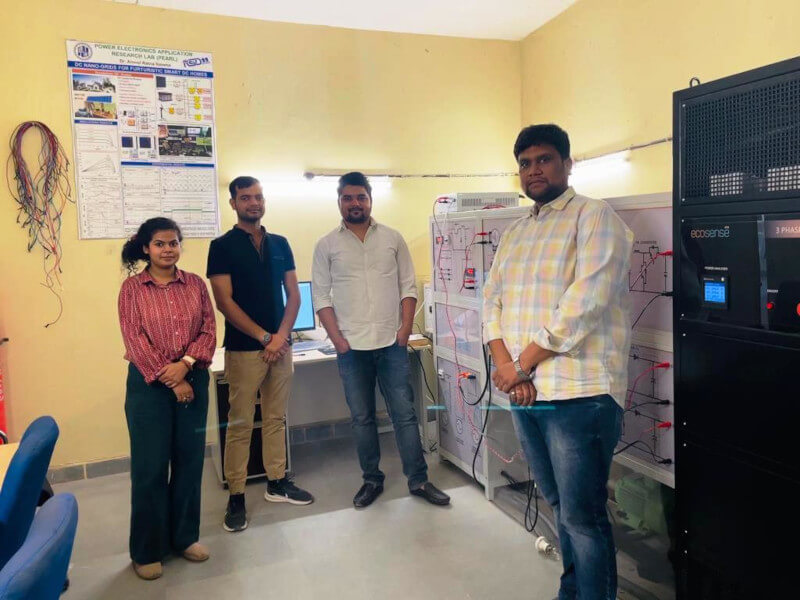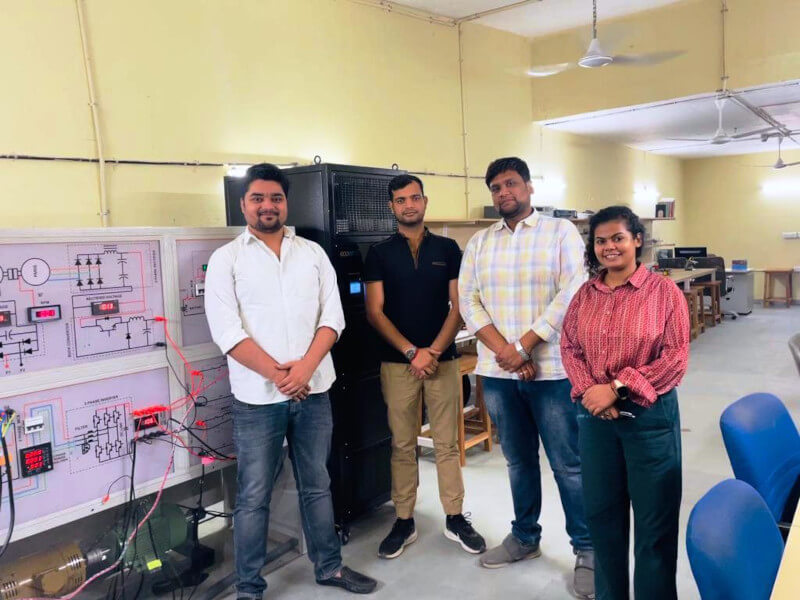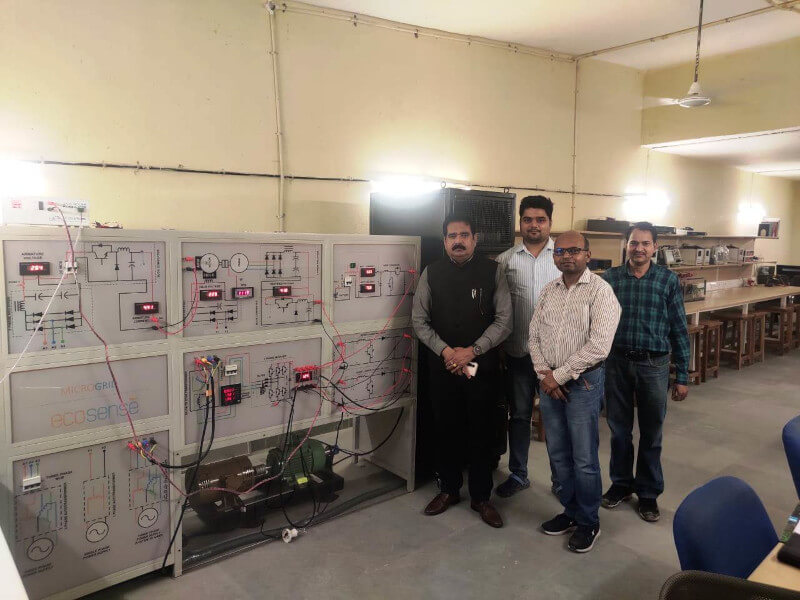Ecosense's installation of a Microgrid system at the Department of Electrical Engineering, NIT Delhi showcases their commitment to delivering advanced renewable energy solutions. By incorporating various components like PV Emulator, Wind Turbine Emulator, Fuel Cell, Battery bank, AC and DC Loads, the Microgrid lab offers researchers the opportunity to investigate and understand the performance of microgrid systems in diverse scenarios.
The PV Emulator simulates the behaviour of solar photovoltaic panels, allowing researchers to analyse how the microgrid responds to solar energy generation. The Wind Turbine Emulator, on the other hand, replicates the characteristics of a wind turbine, enabling the study of wind energy integration and its impact on the microgrid system.
Additionally, the presence of a Fuel Cell and Battery bank facilitates energy storage within the microgrid. This feature allows researchers to explore the dynamics of energy storage, including charging and discharging processes, and evaluate the system's overall efficiency and stability.
Moreover, the availability of both AC and DC Loads enables researchers to connect different types of loads to the microgrid system and observe how they influence its behaviour. This comprehensive setup allows for a thorough analysis of the microgrid's performance and behaviour, ensuring a better understanding of its operational dynamics.
Why Ecosense’s Hybrid AC/DC Microgrid?
The modular and scalable design of the system makes it easy to add more energy sources, while requiring very little space for installation. Ecosense's Microgrid lab is a grid-connected setup where the output of the DC Microgrid is connected to the main AC grid via a Voltage Source Converter (VSC). The system can also be configured to work as a standalone setup, providing researchers with the flexibility to conduct experiments according to their specific needs.
The Microgrid lab offers a variety of research options, from the ability to track the torque-speed and power-speed characteristics of a wind turbine at different wind speeds and pitch angles, to the comparative analysis of different PV panels using a PV emulator. The system allows for the continuous sensing of grid-side voltage and currents, providing an opportunity to implement advanced control algorithms to control the behaviour as per grid conditions.
One of the key advantages of the Ecosense Microgrid system is its modular and scalable design. This allows for the addition of more energy sources as needed, making it easy to expand the system to meet the changing needs of the campus over time. The system is also rigorously tested and can work continuously without switching off, providing a reliable source of research equipment for the university.
The Ecosense Microgrid system requires very little space for installation, making it an ideal solution for the limited space available on a university campus. In addition, the system is designed for easy maintenance and comes with an illustrated experiment manual detailing every wiring connection to be made. This makes it easy for university staff to perform routine maintenance and repairs without the need for extensive technical expertise.
The Microgrid system installed at NIT Delhi is also an open-source system, allowing researchers and innovators to reprogram, rewire, and revise the system to carry out their research goals. The system provides an opportunity for researchers to explore different control techniques for smart grid implementation, conduct a reliability analysis of the Microgrid system, and investigate the use of advanced energy management systems (EMS) to optimize the scheduling of energy sources, storage, and loads.
With its global outreach and commitment to promoting sustainable energy practices, Ecosense is well-positioned to continue leading the way in the field of renewable energy solutions. Its Microgrid lab at NIT Delhi serves as a testament to the company's dedication to innovation and its mission to reduce carbon emissions and promote a more sustainable future.

Ecosense installs Hybrid AC/ DC Microgrid at NIT Delhi
Technical Characteristics of the system:
• Ability to track torque-speed and power-speed characteristics of a wind turbine at different wind speeds and pitch angle
• Plotting Cp-λ curve to show the turbine characteristics at a particular pitch angle
• Real time tracking of λ could be utilized to track the optimal λ of a turbine
• Maximum power point tracking opportunity based on the generated voltage and current feedback
• Ability to control DC link voltage using bidirectional converter in stand-alone mode
• Research on Microgrid possible as the DC link can accommodate other renewable sources such as PV
• Power flow and quality supplied to the grid can be controlled and analysed
• Further exploration of control techniques for smart grid implementation possible
• Continuous sensing of grid side voltage and currents provide opportunity to implement advanced control algorithms to control the behaviour as per grid conditions
• Implementing different maximum power point algorithm in Wind Turbine Emulator system
• Maintaining minimum reactive power at inverter output to achieve unity power factor and maximise the usable power generation
• Using different differential equations to emulate different Wind Turbine models
• Implementing Anti-islanding protection using fault detection at different loads
• Comparative analysis of different PV panels using PV emulator
• Series-parallel behaviour of different PV panels could be analysed for both stand-alone and grid connected systems
• Study the buck and boost mode of operation of bidirectional converter in the battery back-up system
• Study system performance with three renewable sources connected together to form a DC micro grid with battery as the energy storage device
• Study integration of DC micro-grid to the main AC grid using a 3-phase inverter
• Study the operation of DC micro-grid under various load conditions by applying various DC and AC loads
Customisations offered for NIT Delhi
Ecosense worked along with Dr. Anmol Ratan Saxena (HOD, Electrical Engineering Department) to customize the microgrid as per his requirements:
• Flexibility in DC Link Voltage: The DC Link Voltage now can be set from 30 V to 150 V facilitating addition of sources with lower voltage to the microgrid
• Provision of Wind Profiles: Various wind profiles can be actualised through microgrid with Simulated Mode and Table Mode

Ecosense installs Hybrid AC/ DC Microgrid at NIT Delhi
Demonstration and Training
After successful installation of system, Product Demonstration is conducted. The Product Demonstration was focused on how to efficiently utilize the system and explaining the different features of the system.

Ecosense installs Hybrid AC/ DC Microgrid at NIT Delhi
Director NIT Delhi visits the Lab
Prof. (Dr.) Ajay K. Sharma paid a visit to the Lab and appreciated the efforts of the Department of Electrical Engineering, NIT Delhi and Ecosense Team for this lab installation.
The Road Ahead
The faculty at NIT Delhi was overjoyed with the installation of the Microgrid Lab and they are committed to make it even smarter with their ongoing research activities.
